Module 11 Unit 2Here are some ways to welcome them. 课件 2023-2024学年初中英语外研版七年级下册(29张PPT)
文档属性
| 名称 | Module 11 Unit 2Here are some ways to welcome them. 课件 2023-2024学年初中英语外研版七年级下册(29张PPT) | 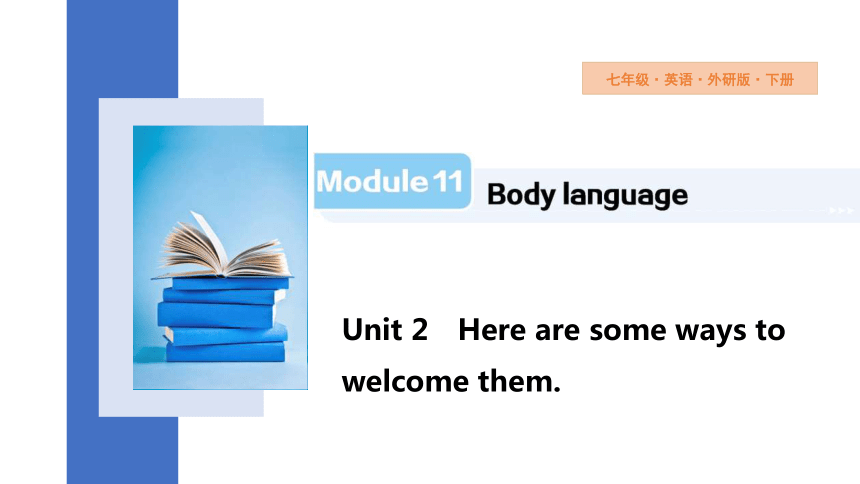 | |
| 格式 | pptx | ||
| 文件大小 | 749.2KB | ||
| 资源类型 | 教案 | ||
| 版本资源 | 外研版 | ||
| 科目 | 英语 | ||
| 更新时间 | 2024-02-20 22:11:12 | ||
图片预览


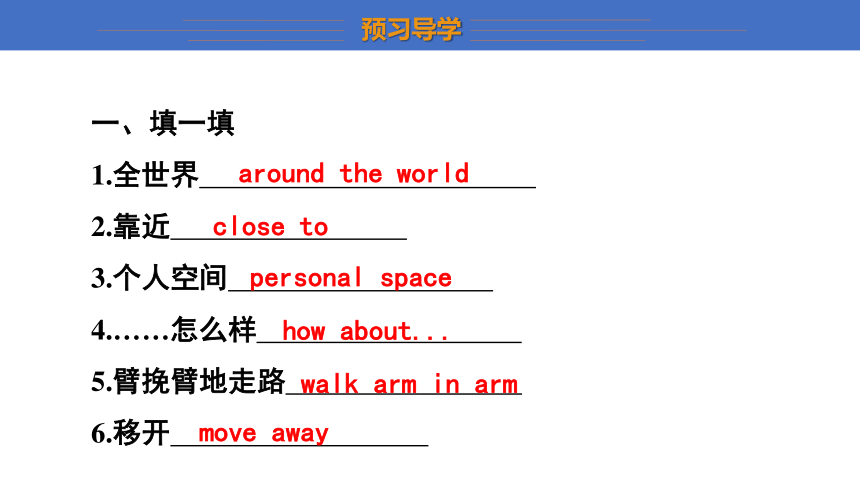
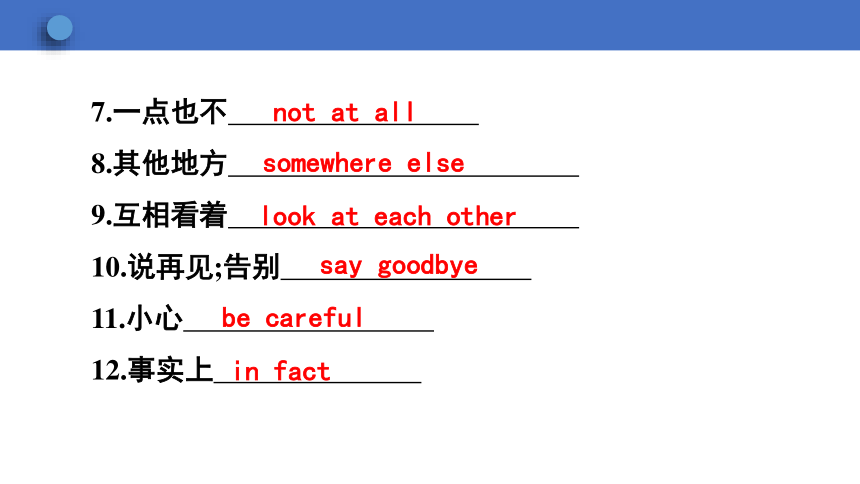
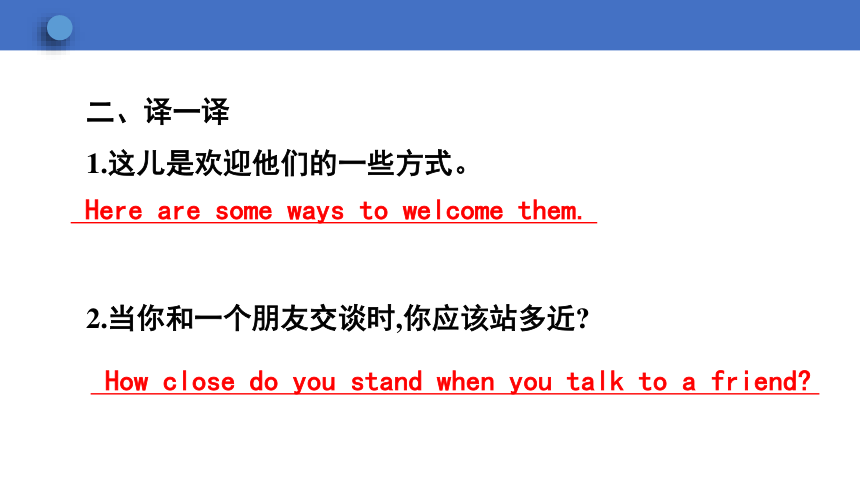
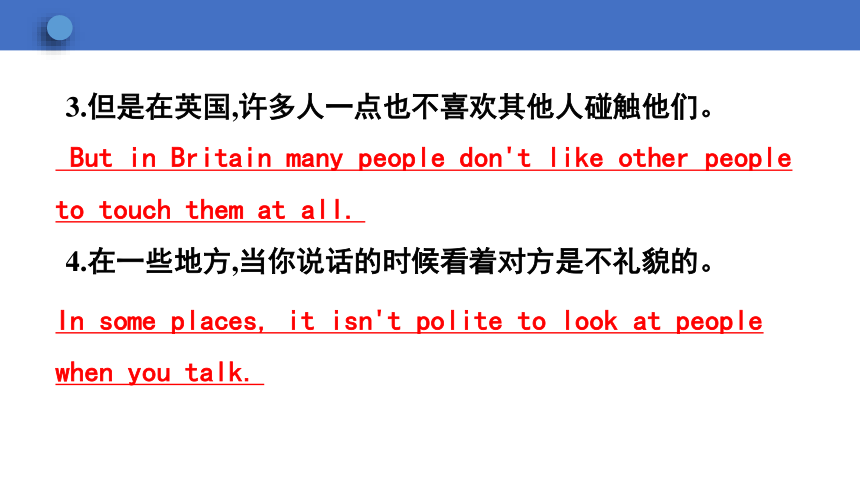


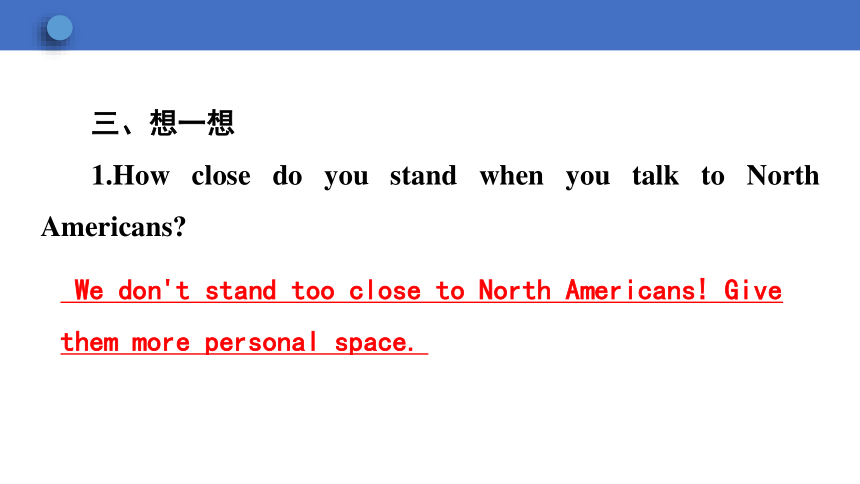
文档简介
(共29张PPT)
七年级·英语·外研版·下册
Unit 2 Here are some ways to welcome them.
◎课时重点:
1.熟练运用表示身体部位的单词,能对由不同助动词引导的一般疑问句作出正确的回答。
2.了解祈使句的构成及其否定句的变化方法。
一、填一填
1.全世界
2.靠近
3.个人空间
4.……怎么样
5.臂挽臂地走路
6.移开
around the world
close to
personal space
how about...
walk arm in arm
move away
7.一点也不
8.其他地方
9.互相看着
10.说再见;告别
11.小心
12.事实上
not at all
somewhere else
look at each other
say goodbye
be careful
in fact
二、译一译
1.这儿是欢迎他们的一些方式。
2.当你和一个朋友交谈时,你应该站多近
Here are some ways to welcome them.
How close do you stand when you talk to a friend
3.但是在英国,许多人一点也不喜欢其他人碰触他们。
4.在一些地方,当你说话的时候看着对方是不礼貌的。
But in Britain many people don't like other people to touch them at all.
In some places, it isn't polite to look at people when you talk.
5.你怎样说再见
6.在希腊,那是绝对不礼貌的!事实上,那很粗鲁!
How do you say goodbye
In Greece, it's not at all polite! In fact, it's very rude!
7.不要上课迟到。
Don't be late for class.
三、想一想
1.How close do you stand when you talk to North Americans
We don't stand too close to North Americans! Give them more personal space.
2.Do many people in Britain like other people to touch them
3.Is it polite to wave to say goodbye in Greece
No, they don't like other people to touch them at all.
No, it isn't.
1.听课本第2部分的录音,回答下面的问题。
(1)Is it right to stand close to people in North America
(2)How do Chinese girls often walk with their friends
听力练习
No, it isn't.
Arm in arm.
(3)What do South Americans sometimes do when they talk to you
(4)Do people in Britain look at each other when they talk
(5)What is rude in Greece
They hold your arm.
Yes, they do.
Wave to say goodbye.
2.再听课本第2部分的录音,完成下面的句子。
(1)People from foreign countries have body language from us.
(2)In Britain, people don't like to other people.
(3)Remember to give someone from . lots of personal space.
different
touch
North America
(4)In some places, it isn't polite to people when you talk.
(5)In Greece, it's rude to goodbye.
look at
wave
1.根据课本第2部分的内容,完成相应的问答题。然后小组内进行问答练习,加深对课文内容的记忆。
完成任务所需的语言结构:
A:Is body language the same in different countries
B:No, it isn't.
A:Is it all right to stand close to people in the Middle East
B:Yes, it is.
阅读练习
A:Do the British like touching people
B:No, they don't.
A:Do Americans look at people when they talk
B:Yes, they do.
A:Do people in Greece wave to say goodbye
B:No, they don't.
2.认真阅读课本第6部分,了解什么是祈使句,什么是否定祈使句。以小组的形式,用祈使句制定更多的课堂规则。
Don't talk in class.
Don't sleep in class.
Listen to the teacher carefully.
Don't look outside in class.
Don't make noise in class.
3.根据你的个人情况,回答下面的问题。
(1)Are you late for class
(2)Do you eat food in class
(3)Do you sleep in class
(4)Do you listen to the teacher carefully
(5)Do you talk in class
1.以小组的形式选出正确的问答语,并进行问答练习。 教师将全班同学分为A、B两组,对不同地方的身体语言进行问答训练。
Group A:
(1)Can you stand close to people in the Middle East
(2)Who sometimes hold your arm when they talk to you
(3)How do you say goodbye
听读练习
(4)What do Americans do when they talk
(5)Who don't like other people to touch them
Group B:
a:Yes, we can.
b:South Americans.
c:Wave to say goodbye.
d:Look at each other.
e:Many people in Britain don't like other people to touch them.
2.听录音,进行朗读练习。
●How about touching people 碰触人怎么样
how about意为“……怎么样 ”,是提建议的一种句式。how about 的同义短语是what about。how about 后接名词、代词或动词ing 形式。例如:
How about going shopping 购物怎么样
表示提建议的句子还有:“Shall we do something Let's do something. Would you like to do something Why not do something Why don't you do something ”等。
做一做:单项选择。
( )1.How about to the zoo to watch the animals
A.go B.going
C.goes D.went
( )2.Why not a movie with us
A.watch B.to watch
C.watching D.watches
B
A
●And here are some ways to welcome them. 这儿是欢迎他们的一些方式。
a/the way to do sth.意为“做某事的方式/方法”。
a/the way to do sth.的同义短语是a/the way of doing sth.。
做一做:单项选择。
( )—Can you tell me some ways English
—Yes, I'm glad to help you.
A.learning B.to learn
C.of learn D.to learning
B
●But be careful! In Greece, it's not at all polite! In fact, it's very rude!但是小心!在希腊,那绝对是不礼貌的!事实上,那很粗鲁!
1.be careful意为“小心”,其同义短语为:look out/take care。
careful 的副词形式是carefully。 careful 常和be 动词连用,修饰名词,carefully则修饰动词。
2.It's not polite to do sth.意为“做某事是不礼貌的”,it 是形式主语,真正的主语是to do sth.。
3.It's rude to do sth.意为“做某事是粗鲁的”。
做一做:单项选择。
( )1.We should listen to the teacher in class.
A.care B.careful
C.carefully D.careless
( )2.Is it polite at people when you talk
A.look B.to look
C.looking D.looks
C
B
七年级·英语·外研版·下册
Unit 2 Here are some ways to welcome them.
◎课时重点:
1.熟练运用表示身体部位的单词,能对由不同助动词引导的一般疑问句作出正确的回答。
2.了解祈使句的构成及其否定句的变化方法。
一、填一填
1.全世界
2.靠近
3.个人空间
4.……怎么样
5.臂挽臂地走路
6.移开
around the world
close to
personal space
how about...
walk arm in arm
move away
7.一点也不
8.其他地方
9.互相看着
10.说再见;告别
11.小心
12.事实上
not at all
somewhere else
look at each other
say goodbye
be careful
in fact
二、译一译
1.这儿是欢迎他们的一些方式。
2.当你和一个朋友交谈时,你应该站多近
Here are some ways to welcome them.
How close do you stand when you talk to a friend
3.但是在英国,许多人一点也不喜欢其他人碰触他们。
4.在一些地方,当你说话的时候看着对方是不礼貌的。
But in Britain many people don't like other people to touch them at all.
In some places, it isn't polite to look at people when you talk.
5.你怎样说再见
6.在希腊,那是绝对不礼貌的!事实上,那很粗鲁!
How do you say goodbye
In Greece, it's not at all polite! In fact, it's very rude!
7.不要上课迟到。
Don't be late for class.
三、想一想
1.How close do you stand when you talk to North Americans
We don't stand too close to North Americans! Give them more personal space.
2.Do many people in Britain like other people to touch them
3.Is it polite to wave to say goodbye in Greece
No, they don't like other people to touch them at all.
No, it isn't.
1.听课本第2部分的录音,回答下面的问题。
(1)Is it right to stand close to people in North America
(2)How do Chinese girls often walk with their friends
听力练习
No, it isn't.
Arm in arm.
(3)What do South Americans sometimes do when they talk to you
(4)Do people in Britain look at each other when they talk
(5)What is rude in Greece
They hold your arm.
Yes, they do.
Wave to say goodbye.
2.再听课本第2部分的录音,完成下面的句子。
(1)People from foreign countries have body language from us.
(2)In Britain, people don't like to other people.
(3)Remember to give someone from . lots of personal space.
different
touch
North America
(4)In some places, it isn't polite to people when you talk.
(5)In Greece, it's rude to goodbye.
look at
wave
1.根据课本第2部分的内容,完成相应的问答题。然后小组内进行问答练习,加深对课文内容的记忆。
完成任务所需的语言结构:
A:Is body language the same in different countries
B:No, it isn't.
A:Is it all right to stand close to people in the Middle East
B:Yes, it is.
阅读练习
A:Do the British like touching people
B:No, they don't.
A:Do Americans look at people when they talk
B:Yes, they do.
A:Do people in Greece wave to say goodbye
B:No, they don't.
2.认真阅读课本第6部分,了解什么是祈使句,什么是否定祈使句。以小组的形式,用祈使句制定更多的课堂规则。
Don't talk in class.
Don't sleep in class.
Listen to the teacher carefully.
Don't look outside in class.
Don't make noise in class.
3.根据你的个人情况,回答下面的问题。
(1)Are you late for class
(2)Do you eat food in class
(3)Do you sleep in class
(4)Do you listen to the teacher carefully
(5)Do you talk in class
1.以小组的形式选出正确的问答语,并进行问答练习。 教师将全班同学分为A、B两组,对不同地方的身体语言进行问答训练。
Group A:
(1)Can you stand close to people in the Middle East
(2)Who sometimes hold your arm when they talk to you
(3)How do you say goodbye
听读练习
(4)What do Americans do when they talk
(5)Who don't like other people to touch them
Group B:
a:Yes, we can.
b:South Americans.
c:Wave to say goodbye.
d:Look at each other.
e:Many people in Britain don't like other people to touch them.
2.听录音,进行朗读练习。
●How about touching people 碰触人怎么样
how about意为“……怎么样 ”,是提建议的一种句式。how about 的同义短语是what about。how about 后接名词、代词或动词ing 形式。例如:
How about going shopping 购物怎么样
表示提建议的句子还有:“Shall we do something Let's do something. Would you like to do something Why not do something Why don't you do something ”等。
做一做:单项选择。
( )1.How about to the zoo to watch the animals
A.go B.going
C.goes D.went
( )2.Why not a movie with us
A.watch B.to watch
C.watching D.watches
B
A
●And here are some ways to welcome them. 这儿是欢迎他们的一些方式。
a/the way to do sth.意为“做某事的方式/方法”。
a/the way to do sth.的同义短语是a/the way of doing sth.。
做一做:单项选择。
( )—Can you tell me some ways English
—Yes, I'm glad to help you.
A.learning B.to learn
C.of learn D.to learning
B
●But be careful! In Greece, it's not at all polite! In fact, it's very rude!但是小心!在希腊,那绝对是不礼貌的!事实上,那很粗鲁!
1.be careful意为“小心”,其同义短语为:look out/take care。
careful 的副词形式是carefully。 careful 常和be 动词连用,修饰名词,carefully则修饰动词。
2.It's not polite to do sth.意为“做某事是不礼貌的”,it 是形式主语,真正的主语是to do sth.。
3.It's rude to do sth.意为“做某事是粗鲁的”。
做一做:单项选择。
( )1.We should listen to the teacher in class.
A.care B.careful
C.carefully D.careless
( )2.Is it polite at people when you talk
A.look B.to look
C.looking D.looks
C
B
同课章节目录
- Module 1 Lost and found
- Unit 1 Whose bag is this?
- Unit 2 Are they yours?
- Unit 3 Language in use
- Module 2 What can you do ?
- Unit 1 I can play the piano
- Unit 2 I can run really fast
- Unit 3 Language in use
- Module 3 Making plans
- Unit 1 What are you going to do at the weekends?
- Unit 2 We're going to cheer the players.
- Unit 3 Language in use
- Module 4 Life in the future
- Unit 1 Everyone will study at home
- Unit 2 Every family will have a small plane.
- Unit 3 Language in use
- Module 5 Shopping
- Unit 1 What can I do for you?
- Unit 2 You can buy everything on the Internet
- Unit 3 Language in use
- Module 6 Around town
- Unit 1 Could you tell me how to get to the Nationa
- Unit 2 The London Eye is on your right.
- Unit 3 Language in use
- Revision module A
- Module 7 My past life
- Unit 1 I was born in a small village.
- Unit 2 I was born in Quincy.
- Unit 3 Language in use
- Module 8 Story time
- Unit 1 Once upon a time….
- Unit 2 Goldilocks hurried out of the house.
- Unit 3 Language in use
- Module 9 Life history
- Unit 1 He left school and began work at the age of
- Unit 2 He decided to be an actor.
- Unit 3 Language in use
- Module 10 A holiday journey
- Unit 1 What did you do?
- Unit 2 This morning we took a walk.
- Unit 3 Language in use
- Module 11 Body language
- Unit 1 They touch noses!
- Unit 2 Here are some ways to welcome them.
- Unit 3 Language in use
- Module 12 Western music
- Unit 1 It's so beautiful!
- Unit 2 Vienna is the centre of European classical
- Unit 3 Language in use
- Revision module B
